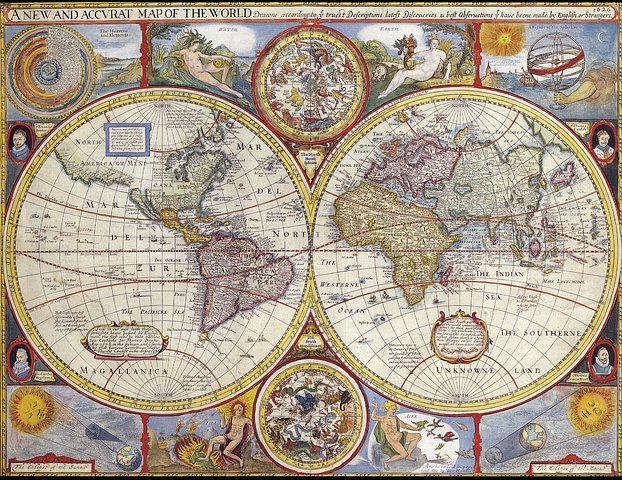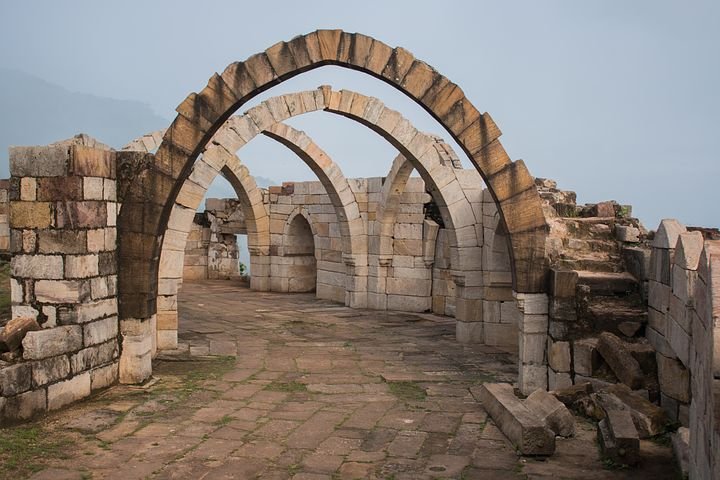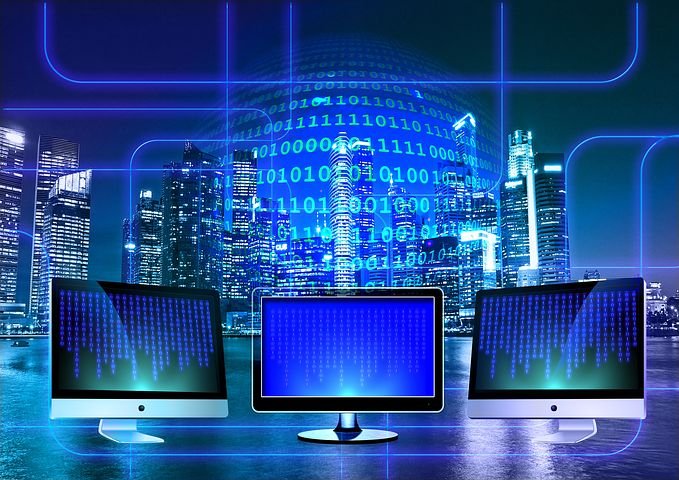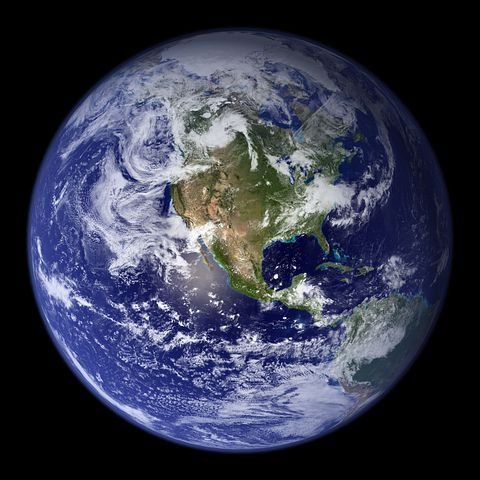The history of the world is an ever-changing and evolving tale of humanity's interactions with their environment. From hunter-gatherers to modern civilizations, the world has been through a lot. Here is a brief overview of some of the most significant moments in world history.

The old world was marked by war, famine, and disease. The new world is marked by peace, prosperity, and technology. But how did we get from one to the other? Let's take a look at the history of the world.
The first humans are thought to have appeared in Africa around 200,000 years ago. They spread out across the globe, and eventually developed into various different cultures. Around 5000 BC, humans began to develop agriculture, which allowed them to settle down and form civilizations.

Over time, these civilizations grew more complex. They developed writing systems, mathematics, and astronomy. They also built great empires, such as the Babylonian Empire and the Roman Empire. In 1492 AD, Christopher Columbus sailed to America, opening up a new era of exploration and discovery.
The latest world is compared to the old world. In the old world, people were controlled by kings and queens. If you didn't obey the king or queen, you would be punished. Today, we have democracy. In the old world, there was no such thing as freedom of speech. You couldn't say anything bad about the king or queen without getting into trouble. Today, we have freedom of speech. You can say whatever you want without getting into trouble. In the old world, there was no such thing as freedom of religion. You had to believe in the same religion as the king or queen. Today, we have freedom of religion.

What is the old world? The old world is a time when things were done a certain way and there was no changing it. What is the new world? The new world is a time of innovation and change. With new technology comes new ways of doing things.
How did the old world meet the new world? Slowly at first, but then with a bang. The printing press brought ideas and thoughts to people all over the world, and suddenly, different cultures were interacting with each other in ways they never had before. This led to new discoveries, inventions, and ways of thinking.
What caused the old world to end? Technology advanced so quickly that it soon became irrelevant. Instead of relying on horses and carriages, people were using cars and planes. Instead of sending messages through couriers, they could now text or email anyone in the world instantly.
In today's world, there seems to be a disconnection with the past. We are living in a so-called "modern world," but do we really think that our ancestors would recognize it? Probably not. We have advanced technology, but many aspects of society have reverted back to more barbaric times.

For example, take a look at how people treat animals. In the old world, animals were seen as property and were often treated cruelly. Nowadays, people are more likely to view animals as companions. Similarly, the natural environment is now being valued more than ever before. Humans are beginning to realize that they cannot just exploit the earth without consequences.
Another example of how the new world is different from the old world is in the realm of education. In ancient times, most people were illiterate and did not have access to knowledge.
[ESP]
La historia del mundo es un relato en constante cambio y evolución de las interacciones de la humanidad con su entorno. Desde los cazadores-recolectores hasta las civilizaciones modernas, el mundo ha pasado por muchas cosas. Aquí hay una breve descripción de algunos de los momentos más significativos de la historia mundial.
El viejo mundo estuvo marcado por la guerra, el hambre y la enfermedad. El nuevo mundo está marcado por la paz, la prosperidad y la tecnología. Pero, ¿cómo llegamos de uno a otro? Echemos un vistazo a la historia del mundo.
Se cree que los primeros humanos aparecieron en África hace unos 200.000 años. Se extendieron por todo el mundo y, finalmente, se convirtieron en varias culturas diferentes. Alrededor del año 5000 a. C., los humanos comenzaron a desarrollar la agricultura, lo que les permitió asentarse y formar civilizaciones.
Con el tiempo, estas civilizaciones se volvieron más complejas. Desarrollaron sistemas de escritura, matemáticas y astronomía. También construyeron grandes imperios, como el Imperio Babilónico y el Imperio Romano. En 1492 dC, Cristóbal Colón navegó a América, abriendo una nueva era de exploración y descubrimiento.
El último mundo se compara con el viejo mundo. En el viejo mundo, la gente estaba controlada por reyes y reinas. Si no obedecías al rey oa la reina, serías castigado. Hoy tenemos democracia. En el viejo mundo, no existía tal cosa como la libertad de expresión. No podías decir nada malo sobre el rey o la reina sin meterte en problemas. Hoy tenemos libertad de expresión. Puedes decir lo que quieras sin meterte en problemas. En el viejo mundo, no existía tal cosa como la libertad de religión. Tenías que creer en la misma religión que el rey o la reina. Hoy tenemos libertad de religión.
¿Qué es el viejo mundo? El viejo mundo es una época en la que las cosas se hacían de cierta manera y no se podía cambiar. ¿Qué es el nuevo mundo? El nuevo mundo es un tiempo de innovación y cambio. Con la nueva tecnología vienen nuevas formas de hacer las cosas.
¿Cómo se encontró el viejo mundo con el nuevo mundo? Lentamente al principio, pero luego con fuerza. La imprenta trajo ideas y pensamientos a personas de todo el mundo y, de repente, las diferentes culturas interactuaban entre sí como nunca antes. Esto condujo a nuevos descubrimientos, invenciones y formas de pensar.
¿Qué causó el fin del viejo mundo? La tecnología avanzó tan rápido que pronto se volvió irrelevante. En lugar de depender de caballos y carruajes, la gente usaba automóviles y aviones. En lugar de enviar mensajes a través de mensajeros, ahora podían enviar mensajes de texto o correos electrónicos a cualquier persona en el mundo al instante.
En el mundo de hoy, parece haber una desconexión con el pasado. Vivimos en el llamado "mundo moderno", pero ¿realmente pensamos que nuestros antepasados lo reconocerían? Probablemente no. Tenemos tecnología avanzada, pero muchos aspectos de la sociedad han vuelto a tiempos más bárbaros.
Por ejemplo, observe cómo las personas tratan a los animales. En el viejo mundo, los animales eran vistos como propiedad y, a menudo, eran tratados con crueldad. Hoy en día, es más probable que las personas vean a los animales como compañeros. Del mismo modo, el entorno natural ahora se valora más que nunca. Los humanos están comenzando a darse cuenta de que no pueden simplemente explotar la tierra sin consecuencias.
Otro ejemplo de cómo el nuevo mundo es diferente del viejo mundo está en el ámbito de la educación. En la antigüedad, la mayoría de las personas eran analfabetas y no tenían acceso al conocimiento.
[UR]
دنیا کی تاریخ ان کے ماحول کے ساتھ انسانیت کے تعامل کی ہمیشہ بدلتی اور بدلتی ہوئی کہانی ہے۔ شکاری جمع کرنے والوں سے لے کر جدید تہذیبوں تک، دنیا بہت کچھ سے گزری ہے۔ یہاں عالمی تاریخ کے چند اہم ترین لمحات کا ایک مختصر جائزہ ہے۔
پرانی دنیا جنگ، قحط اور بیماری کی وجہ سے نشان زد تھی۔ نئی دنیا امن، خوشحالی اور ٹیکنالوجی کے ذریعے نشان زد ہے۔ لیکن ہم ایک سے دوسرے تک کیسے پہنچے؟ آئیے دنیا کی تاریخ پر ایک نظر ڈالتے ہیں۔
خیال کیا جاتا ہے کہ پہلے انسان تقریباً 200,000 سال پہلے افریقہ میں نمودار ہوئے تھے۔ وہ پوری دنیا میں پھیل گئے، اور آخر کار مختلف ثقافتوں میں ترقی کی۔ 5000 قبل مسیح کے آس پاس، انسانوں نے زراعت کو ترقی دینا شروع کی، جس نے انہیں آباد ہونے اور تہذیبوں کی تشکیل کا موقع دیا۔
وقت کے ساتھ ساتھ یہ تہذیبیں مزید پیچیدہ ہوتی گئیں۔ انہوں نے تحریری نظام، ریاضی اور فلکیات کو تیار کیا۔ انہوں نے عظیم سلطنتیں بھی بنائیں، جیسے کہ بابلی سلطنت اور رومی سلطنت۔ 1492 عیسوی میں، کرسٹوفر کولمبس نے امریکہ کا سفر کیا، جس نے تلاش اور دریافت کے ایک نئے دور کا آغاز کیا۔
تازہ ترین دنیا کا موازنہ پرانی دنیا سے کیا جاتا ہے۔ پرانی دنیا میں لوگ بادشاہوں اور رانیوں کے زیر کنٹرول تھے۔ اگر آپ نے بادشاہ یا ملکہ کی بات نہیں مانی تو آپ کو سزا دی جائے گی۔ آج ہمارے ہاں جمہوریت ہے۔ پرانی دنیا میں آزادی اظہار نام کی کوئی چیز نہیں تھی۔ آپ بغیر کسی پریشانی کے بادشاہ یا ملکہ کے بارے میں کچھ برا نہیں کہہ سکتے تھے۔ آج ہمیں اظہار رائے کی آزادی ہے۔ آپ پریشانی میں پڑے بغیر جو چاہیں کہہ سکتے ہیں۔ پرانی دنیا میں مذہب کی آزادی نام کی کوئی چیز نہیں تھی۔ آپ کو اسی مذہب کو ماننا تھا جو بادشاہ یا ملکہ کا تھا۔ آج ہمیں مذہبی آزادی حاصل ہے۔
پرانی دنیا کیا ہے؟ پرانی دنیا ایک ایسا وقت ہے جب چیزیں ایک خاص طریقے سے کی جاتی تھیں اور اس میں کوئی تبدیلی نہیں ہوتی تھی۔ نئی دنیا کیا ہے؟ نئی دنیا جدت اور تبدیلی کا وقت ہے۔ نئی ٹیکنالوجی کے ساتھ کام کرنے کے نئے طریقے آتے ہیں۔
پرانی دنیا نئی دنیا سے کیسے ملی؟ پہلے آہستہ آہستہ، لیکن پھر ایک دھماکے کے ساتھ۔ پرنٹنگ پریس دنیا بھر کے لوگوں کے لیے خیالات اور خیالات لے کر آیا، اور اچانک، مختلف ثقافتیں ایک دوسرے کے ساتھ اس طرح بات چیت کرنے لگیں جو پہلے کبھی نہیں تھیں۔ اس سے نئی دریافتیں، ایجادات اور سوچنے کے طریقے سامنے آئے۔
پرانی دنیا ختم ہونے کی وجہ کیا تھی؟ ٹیکنالوجی نے اتنی تیزی سے ترقی کی کہ یہ جلد ہی غیر متعلق ہو گئی۔ لوگ گھوڑوں اور ریڑھیوں پر بھروسہ کرنے کے بجائے کاریں اور ہوائی جہاز استعمال کر رہے تھے۔ کورئیر کے ذریعے پیغامات بھیجنے کے بجائے، وہ اب دنیا میں کسی کو بھی فوری طور پر ٹیکسٹ یا ای میل کر سکتے ہیں۔
آج کی دنیا میں ماضی سے تعلق منقطع نظر آتا ہے۔ ہم ایک نام نہاد "جدید دنیا" میں رہ رہے ہیں، لیکن کیا ہم واقعی سوچتے ہیں کہ ہمارے آباؤ اجداد اسے پہچانیں گے؟ شاید نہیں۔ ہمارے پاس جدید ٹیکنالوجی ہے، لیکن معاشرے کے بہت سے پہلو مزید وحشیانہ دور کی طرف لوٹ چکے ہیں۔
مثال کے طور پر، ایک نظر ڈالیں کہ لوگ جانوروں کے ساتھ کیسا سلوک کرتے ہیں۔ پرانی دنیا میں جانوروں کو جائیداد کے طور پر دیکھا جاتا تھا اور اکثر ان کے ساتھ ظالمانہ سلوک کیا جاتا تھا۔ آج کل، لوگ جانوروں کو ساتھی کے طور پر دیکھتے ہیں۔ اسی طرح قدرتی ماحول کو اب پہلے سے کہیں زیادہ اہمیت دی جا رہی ہے۔ انسانوں کو یہ احساس ہونے لگا ہے کہ وہ بغیر نتائج کے زمین کا استحصال نہیں کر سکتے۔
نئی دنیا پرانی دنیا سے کس طرح مختلف ہے اس کی ایک اور مثال تعلیم کے دائرے میں ہے۔ قدیم زمانے میں زیادہ تر لوگ ناخواندہ تھے اور علم تک ان کی رسائی نہیں تھی۔
